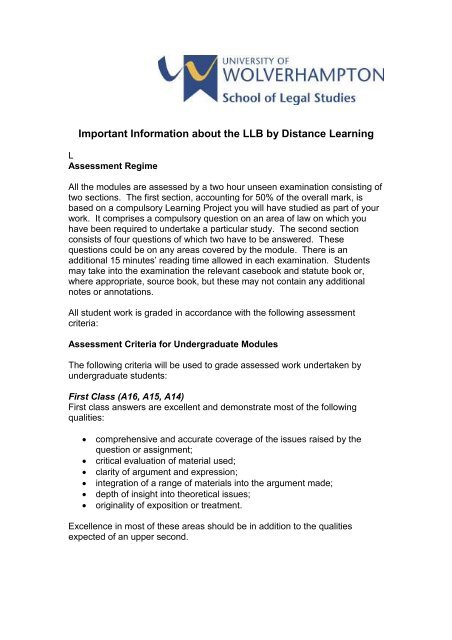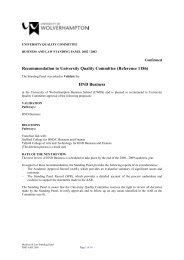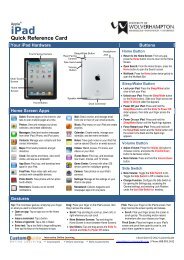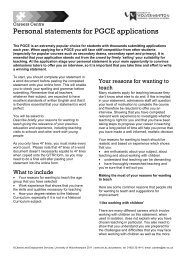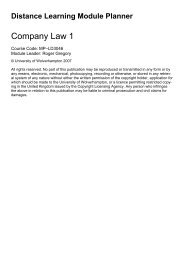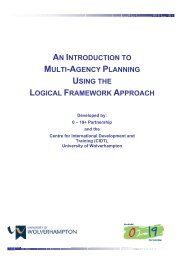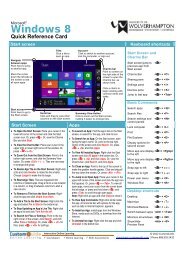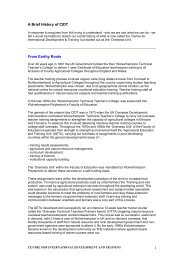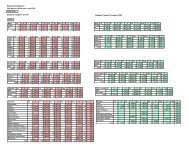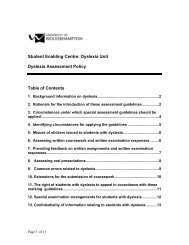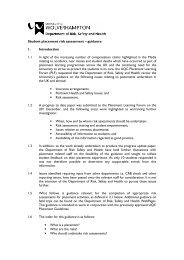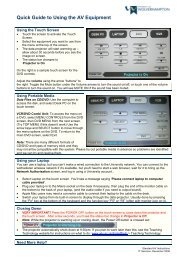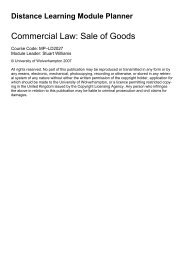Important Information about the LLB by Distance Learning
Important Information about the LLB by Distance Learning
Important Information about the LLB by Distance Learning
Create successful ePaper yourself
Turn your PDF publications into a flip-book with our unique Google optimized e-Paper software.
(PTS4) Use information technologyYou will need to have access to a computer to use material that is held on <strong>the</strong>University’s computers in Wolverhampton, and to email your tutors.(PTS6) Work in teamsThe programme, with its emphasis on individual study <strong>by</strong> students resident invarious locations around <strong>the</strong> world, makes <strong>the</strong> formal development andassessment of teamwork difficult. They are, however, encouraged to formstudy groups wherever possible.(PTS7) Demonstrate numeracyThis skill is not developed on <strong>the</strong> home programme in Wolverhampton and issimilarly not developed on <strong>the</strong> <strong>Distance</strong> <strong>Learning</strong> programme.It should, however, be noted that any student commencing <strong>the</strong>ir studies afterSeptember 2001 will be formally assessed in all three of <strong>the</strong>se areas. Onlythose students who successfully undertake such assessments will obtain aQualifying Law Degree.Module LeaderA module leader is <strong>the</strong> member of academic staff who is responsible for <strong>the</strong>module you are studying. She/he will have written <strong>the</strong> module planner youare using and is responsible for <strong>the</strong> setting and marking of <strong>the</strong> examinationyou will take.He or she can be contacted <strong>by</strong> e mail for advice on matters relating to <strong>the</strong>module <strong>the</strong>y are responsible for, including clarification and help on areas oflaw.Work During <strong>the</strong> ProgrammeProgress TestsEach module planner contains a Progress Test which enables students tomonitor <strong>the</strong>ir understanding of <strong>the</strong> module studied.The Progress Test examines thoroughly <strong>the</strong> topics dealt with in <strong>the</strong> studymaterial and should be treated as a ‘mini-examination’ taken underexamination conditions without reference to any materials.Suggested SolutionsSuggested Solutions are contained in <strong>the</strong> module planner. They demonstratehow problems and essay questions should be answered. It should be notedthat <strong>the</strong>se solutions are more detailed than would be expected from anexamination candidate.
ExaminationsStudents have to take a two-hour unseen examination in each module.Examination questions require knowledge of recent developments within <strong>the</strong>scope of <strong>the</strong> syllabus up to and including material on <strong>the</strong> subject contained in<strong>the</strong> Law Update for that year. Students are given 15 minutes reading time toallow <strong>the</strong>m to think <strong>about</strong> <strong>the</strong> questions set. Copies of <strong>the</strong> relevant casebook,statute book or, where appropriate, source book and Law Update may betaken into <strong>the</strong> examination, but <strong>the</strong>se must not contain additional notes orannotations, o<strong>the</strong>r than highlighting and underlining.The Application for Admission form contains all <strong>the</strong> information required forexamination entry. Once an application has been accepted, and all <strong>the</strong>relevant fees have been paid, students are automatically registered for <strong>the</strong>examinations.Examinations normally take place in <strong>the</strong> first and second week of January,first and second week of May, <strong>the</strong> fourth week of August and <strong>the</strong> first week ofSeptember.Examinations are currently held in London and Hong Kong. Examinationsmay be taken in o<strong>the</strong>r countries or centres. The extra examination locationsare arranged on an annual basis. Examination locations which have beenused in <strong>the</strong> past, or which are under consideration for <strong>the</strong> future, includeAustralia, Bahamas, Barbados, Bermuda, Brunei, Canada, Cyprus, Fiji,Germany, Italy, Jamaica, Japan, Kenya, Malaysia, Mauritius, Pakistan, SaudiArabia, Singapore, Tobago and <strong>the</strong> United States of America. Specialexamination centres are arranged based upon <strong>the</strong> requirements stated <strong>by</strong>students on <strong>the</strong>ir course application form. Note that any special centrerequirement must be stated on <strong>the</strong> application form for admission to <strong>the</strong>course. All examinations are held subject to demand.The exact dates and locations of examinations are notified on <strong>the</strong>Examination Entry Card. Examination Entry Cards are sent approximatelyfour weeks prior to <strong>the</strong> examinations. Students must take this card, toge<strong>the</strong>rwith <strong>the</strong>ir Student Identity Card issued <strong>by</strong> <strong>the</strong> College, and <strong>the</strong>ir national Card(if any), to <strong>the</strong> examination hall to gain admission to <strong>the</strong> examination. Theywill not be allowed to attend <strong>the</strong> examination unless <strong>the</strong>y follow <strong>the</strong>serequirements.
Aspects of studyRate of studyStudents may study between one and eight modules per year with amaximum of four at any one examination session (maximum of five if thisincludes a reassessment). A ‘year’ is three consecutive examination periods.Should a student fail to study at least one module in a year, without applyingfor leave of absence, he/she risks being treated as having withdrawn from <strong>the</strong>programme. The degree must be completed within 6 years of enrolment on<strong>the</strong> programme.Discontinuity of studyAs long as students provide written notice <strong>the</strong>y may interrupt <strong>the</strong>ir studies forup to two years on one occasion.Resits and RetakesThere is no limit on <strong>the</strong> number of resits/retakes a student is allowed (but see<strong>the</strong> section on Qualifying Law Degrees).Definitions of ‘resit’ and ‘retake’‘Resit’ means students have to be re-examined in <strong>the</strong> failed module, withoutbeing required to study <strong>the</strong> whole module again. If, on <strong>the</strong> re-examination,students pass <strong>the</strong> module <strong>the</strong>y will gain credits for it.Students have <strong>the</strong> right, subject to registration, to resit a module if <strong>the</strong>yachieve an overall module grade of E4.‘Retake’ means that students must study <strong>the</strong> entire module again and <strong>the</strong>npass an examination in it if <strong>the</strong>y want to gain <strong>the</strong> credits for that module.Students have to retake a module if <strong>the</strong>y are awarded an F grade.If students are retaking a module <strong>the</strong>y must re-register for it <strong>by</strong> informingHolborn College of <strong>the</strong>ir preferred examination session for reassessment.Maximum grade on resitWhen students resit a module <strong>the</strong>y are limited to a maximum grade of D5,regardless of actual performance in <strong>the</strong> resit.Maximum grade on retakeThere is no limit on <strong>the</strong> grade that can be awarded for a retake. However,students cannot carry forward any grades from <strong>the</strong>ir previous attempt at <strong>the</strong>module, even if <strong>the</strong>se were higher that those achieved in <strong>the</strong> retake.
Regulations Relating to <strong>the</strong> <strong>LLB</strong> (Hons) Senior Status DegreePeriod of time for completionStudents enrolling on or after 1 September 2002 must complete <strong>the</strong>ir studiesfor a Senior Status degree in 4 years.Number of modules required to be passed for award of a Senior Status<strong>LLB</strong> (Hons)Level 1Students are required to study and pass six (90 credits) Level 1 modules.Level 2/3Students are required to study and pass 13 (195 credits) Level 2/3 modules ofwhich 7 (105 credits) modules must be at Level 3.Classification of a Senior Status <strong>LLB</strong> (Hons)Senior Status <strong>LLB</strong> (Hons) will be classified on <strong>the</strong> best 165 Level 2/3 credits.Borderline cases will be dealt with in accordance with standard Universitypractice.Rights of retrievalThere are unlimited rights of retrieval within <strong>the</strong> overall time limit for <strong>the</strong>degree (but see <strong>the</strong> Qualifying Law Degree requirements).Number of modules required for award of a Senior Status <strong>LLB</strong> withouthonoursNote: a Senior Status <strong>LLB</strong> without honours is not a Qualifying law Degree,and is normally only awarded to students unsuccessful in obtaining a <strong>LLB</strong>(Hons) <strong>by</strong> Senior Status.Level 1Students are required to study and pass six (90 credits) Level 1 modules.Level 2Students are required to pass ten (150 credits) Level 2/3 modules, of whichfive (75 credits) must be at Level 3.
<strong>LLB</strong> withHonoursStandard EntryOverall credits required: 360*Total credits must include:Levels 2 & 3 = minimum 210(of which 105 must be fromLevel 3)Senior StatusOverall credits required: 285*Total credits must include:Levels 2 & 3 = minimum 195(of which 105 must be fromlevel 3)<strong>LLB</strong> withoutHonoursOverall credits required:*Minimum = 285*Maximum = 300Total credits must include:Levels 2 & 3 = minimum180 (of which 75 must befrom Level 3)Overall credits required:*Minimum = 240*Maximum = 270Total credits must include:Levels 2 & 3 = minimum 150(of which 75 must be fromLevel 3)Academic MisconductThis can take three forms and can lead to serious penalties being imposed,ranging from automatic failure of <strong>the</strong> modules in respect of which <strong>the</strong>misconduct occurred, to being required to withdraw from <strong>the</strong> University.The first form of misconduct is cheating in respect of examinations. Thisinvolves a candidate attempting to gain an unfair advantage <strong>by</strong> dishonestmeans, and includes, amongst o<strong>the</strong>r things, all breaches of examination roomrules, impersonating ano<strong>the</strong>r candidate, falsifying data, and obtaining anexamination paper in advance of its authorised release.The second form is plagiarism, which is committed when a studentincorporates a significant amount of unattributed direct quotation from, orunattributed substantial paraphrasing of, <strong>the</strong> work of ano<strong>the</strong>r.The third is collusion, which occurs when two or more students collaborate toproduce a piece of work to be submitted (in whole or in part) for assessmentand <strong>the</strong> work is presented as <strong>the</strong> work of one student alone.Extenuating CircumstancesIf students experience any problem which adversely affects <strong>the</strong>ir performancein one or more examinations or o<strong>the</strong>r assessed work, <strong>the</strong>y must inform <strong>the</strong>Award Director for <strong>the</strong> <strong>LLB</strong> <strong>by</strong> <strong>Distance</strong> <strong>Learning</strong>, using Form AA034, withinseven days of <strong>the</strong> problem occurring. Students are, <strong>the</strong>refore, advised to fax
<strong>the</strong> completed copy of <strong>the</strong> form to <strong>the</strong> Examinations Officer at Holborn Collegefor forwarding to <strong>the</strong> Award Director.Copies of <strong>the</strong> form are available on request from <strong>the</strong> Examinations Officer.Deferral of ExaminationsStudents may defer taking an examination for which <strong>the</strong>y are registered <strong>by</strong>giving written notice to <strong>the</strong> Course Coordinator within <strong>the</strong> relevant deferraldeadlines, which are indicated in <strong>the</strong> student’s enrolment document.Examinations ResultsAfter examination papers have been marked and moderated at <strong>the</strong> Universityin consultation with <strong>the</strong> University’s external examiners, results are sent tostudents <strong>by</strong> post.Resit ExaminationsSubject to students having <strong>the</strong> right to do so, <strong>the</strong>y are automatically entered toresit a failed examination at <strong>the</strong> next examination date. The Result Code‘Retrieve in line with Module Status’ may indicate that not all failed modulesmay be retrieved. If you need advice on <strong>the</strong> meaning and effect of yourresults please contact your Course Coordinator.AppealsThe University’s appeals procedure applies only to decisions of AssessmentBoards of <strong>the</strong> University: <strong>the</strong>re is no right of appeal against <strong>the</strong> academicjudgement of an Assessment Board. An appeal may only be lodged against adecision of an Assessment Board where a student believes that anadministrative error or o<strong>the</strong>r material irregularity has occurred, or where <strong>the</strong>rewere personal circumstances which, had <strong>the</strong> Board been aware of <strong>the</strong>m,might have affected its decision.In <strong>the</strong> first instance students should discuss <strong>the</strong>ir concern with <strong>the</strong> AwardDirector for <strong>the</strong> <strong>LLB</strong> <strong>by</strong> <strong>Distance</strong> <strong>Learning</strong>. If a student decides to appeal heor she should write to <strong>the</strong> Head of <strong>the</strong> University’s assessment Unit no laterthan three months after <strong>the</strong> publication of <strong>the</strong> challenged decision, stating <strong>the</strong>grounds for appeal and enclosing any relevant evidence. The appeal will <strong>the</strong>nbe investigated.Congregation, Prizes and ScholarshipsCongregation for <strong>the</strong> award of degrees usually takes place in September ofeach year at Wolverhampton. Graduands are notified of <strong>the</strong> exact date andvenue. Graduands unable to attend convocation will receive <strong>the</strong>ir degreecertificate <strong>by</strong> post.
Absence from ExaminationIf a written notice of deferral is not received within <strong>the</strong> specified deadline,absence from <strong>the</strong> examination will be recorded as Fail unless certifiedevidence is sent for <strong>the</strong> attention of <strong>the</strong> Award Board.Reassessment FeesIf reassessment is required in any module, whe<strong>the</strong>r or not mitigating evidenceis submitted or accepted, a Reassessment Fee is payable. In addition, aContinuing Registration Fee may apply. Details are sent with students’enrolment and module registration documents.
QUESTIONNAIREThe School of Legal Studies and Holborn College attach great importance toyour views. We would, <strong>the</strong>refore, be grateful if you would answer <strong>the</strong>following questions and return <strong>the</strong>m to <strong>the</strong> address given below. Youranswers will be considered <strong>by</strong> <strong>the</strong> distance learning teaching team and usedin updating <strong>the</strong> Award Guide.1. What two things did you find most useful <strong>about</strong> <strong>the</strong> Award Guide?2. What two things did you find <strong>the</strong> least helpful <strong>about</strong> <strong>the</strong> Award Guide?3. Please identify any typographical errors you encountered in using thisGuide (please make reference to appropriate page numbers).Return to:External Programmes AdministratorSchool of Legal StudiesUniversity of WolverhamptonArthur Storer BuildingMolineux StreetWolverhamptonWV1 1SBUnited KingdomYou may if you wish e mail your answers to N.Clark@wlv.ac.uk


